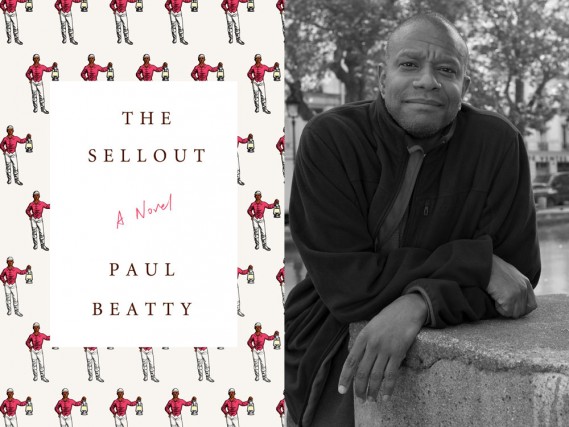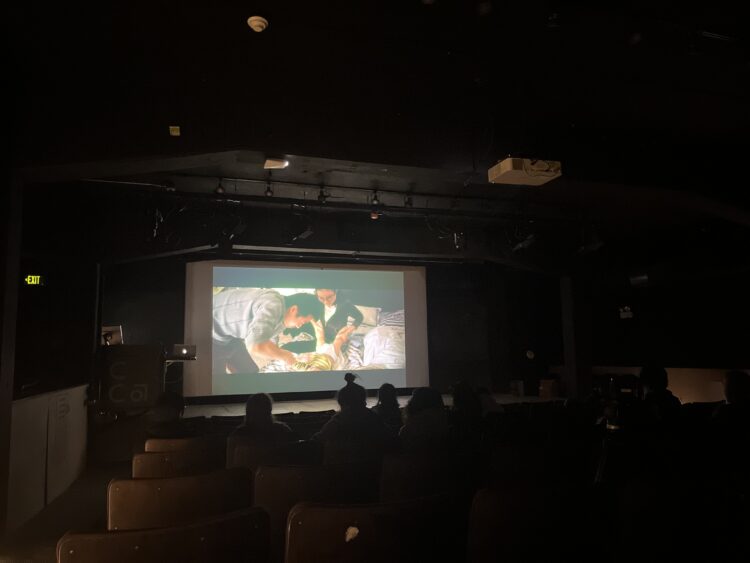Paul Beatty Talks Poetry, Psychology and His New Novel, "The Sellout"

Paul Beatty‘s Creative Capital-supported project, The Sellout, is being released today by Farrar, Straus and Giroux. The novel is a biting satire about a young man’s isolated upbringing and the race trial that sends him to the Supreme Court. It challenges the sacred tenets of the United States Constitution, urban life, the civil rights movement, the father-son relationship, and the holy grail of racial equality—the black Chinese restaurant. The book is already receiving rave reviews, including one from Dwight Garner of The New York Times, who wrote, “The first 100 pages of The Sellout are the most caustic and the most badass first 100 pages of an American novel I’ve read in at least a decade.” We recently caught up with Paul to ask about his background in poetry, his study of psychology and his writing process.
Jenny Gill: You were a Poetry Slam champ and published two books of poetry before you published your first novel, White Boy Shuffle, in 1996. How did that background inform your approach to language when you started writing novels? Do you still write poetry?
Paul Beatty: Poetry has had a huge impact on how I approach literature. Slamming not so much. Poetry is the backbone to how I think about structure and the page. And I’ve yet to break myself of the notion that every word is vitally important—though I’m trying.
Other than that, it forced me to think about the dividing line between being entertaining and being the entertainment; slamming hasn’t been much of an influence. While there’s nothing wrong with literature being entertaining, I realized that I’m very uncomfortable being the entertainment, and slam poetry while sometimes informative, inclusive, fun, and like all forms of poetry, occasionally brilliant, it’s fundamentally about being the entertainment. Many of folks I met in the poetry scene have had a massive influence on me. Lou Asekoff, Tucker Farley, Allen Ginsburg, Quincy Troupe, Jayne Cortez, Pamela Hughes, Danny Shot, Karen Kelley, Joanna Sit, Steve Cannon, John Farris, Bob Holman, Lisa Jarnot, Willie Perdomo, Maggie Estep and Mike Tyler were folks who taught me a great deal about literature and language. Sorry for the litany, but sometimes one has to acknowledge.
Jenny: I think it’s really interesting that you hold both an MFA in Creative Writing and an MA in Psychology. Can you talk about that trajectory a bit, and how you came to writing?
Paul: Psych or writing. I just pursued what interested me. It’s not that deep. In the same ways poetry informs my writing, studying psychology has shaped the way I think, the way I see and interpret the world around me.
I came to writing because in college I realize that writing gave me satisfaction. Not much in life does. And nothing does like writing. Maybe a cold glass of Welch’s grape juice and a Taco Bell taco used to, but these days Welch’s is too sweet and Taco Bell’s beef and cheese doesn’t taste like beef and cheese.
Paul Beatty presents his Creative Capital Project at the 2013 Creative Capital Retreat
Jenny: You’ve been working on The Sellout since 2009. How did this project evolve over the years?
Paul: Word by word. Lots of false starts. I was never very good at doing puzzle mazes, and have gotten worse as I’ve aged, but like doing a maze, when I write I have a general idea of where the exit is, but it takes forever for me to get there.
Jenny: Creative Capital specifically seeks out risky, ambitious work that might not receive support from more traditional funders. Can you talk about the risks you took in The Sellout?
Paul: Not really. The risks I took would bore you, and any risks I said I took would be lies.
Jenny: Well, I think satire is by its nature a pretty risky genre. Was there any point when you were writing The Sellout when you worried that it might just not work?
Paul: I worry about everything. I worry about the creative part, and I worry about the reception. I worry that not everyone will get all the layers, but try to make them work on a number of levels, so two readers might be laughing/crying at the same passage, but crying/laughing for two completely different reasons.
Jenny: What is your writing process like? Do you usually write at a specific time of the day? Do you focus on one book at a time, or have multiple projects in the works?
Paul: I try not to ignore myself… my thoughts… my goals… my ideas. I just sit down and write. Like my mentor Louis Asekoff so often says, “Writers write.” There really isn’t much more to it than that. Sit down and write.
The Sellout, published by Farrar, Straus and Giroux, is available through Amazon and in wide release.
